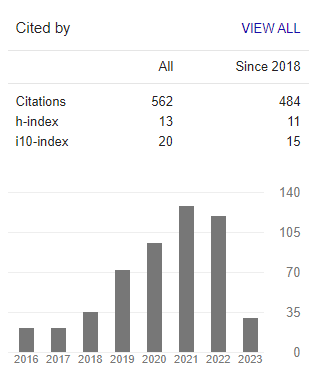GENDER TYPING PADA PRODUK TEKNOLOGI DALAM KOMUNITAS ONLINE
Abstract
The growing usage of technological products such as smartphones has an evitable consequence in social practices in terms of smartphone consumptions. These practices are not only related to class construction and social status, but also identity struggles in terms of gender construction particulary in one of the Apple’s largest online communities on Instagram; @idevice.indonesia. Using cultural studies approach, this paper exposes the meanings behind the practice of gender typing towards iPhone products within the @idevice.indonesia community. Gender typing is a process in which a person associates him/herself with a particular gender and then behaves accordingly to the values and the attributes adopted with the particular sex that they identify as his/hers. From this analysis an insightful picture was produced regarding the meanings behind the practice of gender typing towards product technology in Indonesia that can provide critical inspiration for consumers as well as contribution for technology producers.
Keywords
References
Albert. 14 Juni, 2015. Gender Typing. Albert, tersedia di: https://www.albert.io/blog/gender-typing-ap-psychology-crash-course/
Bakardjieva, M. 2005. Internet Society: The Internet in Everyday Life. London: Sage Publications Ltd.
Barker, C. 2011. Cultural Studies: Teori dan Praktik. Yogyakarta: Kreasi Wacana.
Bell, D. 2007. Castells’ Key Ideas. Dalam Cyberculture Theorists: Manuel Castells dan Donna Haraway. USA dan Kanada: Routledge.
Bhinneka. 2016. Nexian Glam Series. Bhinneka, tersedia di: http://www.bhinneka.com/aspx/products/prt_Nexian_Glam_Series.aspx
Capatina, G. dan Draghescu, F. 2015. Success Factors of New Product: The Case of iPhone Launch. International Journal of Economics and Finance, Vol. 7(5)
Creswell, J. W. 2010. Research Design: Pendekatan Kualitatif, Kuantitatif, dan Mixed (Edisi Ketiga).
Chandler, D. 2007. Semiotics The Basics (second edition). New York: Routledge.
Citizen6. 2016. Peristiwa Dramatis yang Terjadi Lantaran iPhone. Liputan6, tersedia di: http://citizen6.liputan6.com/read/2335889/6-peristiwa-dramatis-yang-terjadi-lantaran-i-phone
CNBC. 2014. Why Isn’t Apple on Twitter. CNBC, tersedia di: http://www.cnbc.com/2014/02/21/why-isnt-apple-on-twitter.html
Dictionary, O. 2016. Technology. Oxford Dictionaries, tersedia di: https://en.oxforddictionaries.com/definition/technology
Durham, M. G., & Kellner, D. 2006. Media and cultural studies: Keyworks. Malden, MA: Blackwell.
Eco, U. 1976. A Theory of Semiotics. Bloomington, IN: Indiana University Press/ London: Macmillan.
El Hilali, N. dan Mathieu, J. P. 2012. The Power of Concept in Product Design, Smartphone Nomad Artifact: Semiotic Analysis of One of Them: Apple iPhone. International Conference on Kensei Engineering and Emotion Research (KEER).
Fakih, M. 1999. Analisis dan Transformasi Sosial. Yogyakarta: Pustaka Pelajar.
Goggin, G. 2009. Adapting the Mobile Phone: The iPhone and Its Consumption Continuum. Journal of Media & Cultural Studies, Vol. 23(2), 231-244
Hall S, Jessica E & Sean N. 2013. Representation. London: SAGE Publication
Hall, S., Evans, J., & Nixon, S. 2013. Representation. Dalam Stuart Hall, Jessie Evans & Sean Nixon (eds), Representation. London: Sage Publications, 1-13.
Huffington. 2016. Status Insanity. Huffington Post, tersedia di: http://www.huffingtonpost.com/sandip-roy/status-insanity-why-the-ib5801748.html
Ibrahim, Y. 2015. Instagramming Life: Banal Imaging and the Poetics of the Everyday. Journal of Media Practice, Vol. 16(1), 42–54.
Jung, K. 2006. Cross-Gender Brand Extensions: Effects of Gender of Brand, Gender of Consumer and Product Type on Evaluation of Cross-Gender Extensions. In Pechmann, C. and Price, L. Duluth (eds), Advances in Consumer Research Vol. 33, MN: Association for Consumer Research, 67-74.
Kania, D. & Agatha, N. 2011. Online Consumers and The Application of Uses and Gratification Theory Case Study: The Kaskus Website. Journal Communication Spectrum: Indonesian Journal of Communication and Culture, Vol. 1(2), 91-107
Kosut, M. 2012. Encyclopedia of gender in media. Thousand Oaks, Calif: SAGE Publications
Lashinsky, A. 2012. Inside Apple: Bagaimana Perusahaan Amerika yang Paling Dikagumi –dan Suka Berahasia- Sesungguhnya Bekerja. Perwira Leo Sabath (penj.). Yogyakarta: Penerbit ANDI.
Memegenerator. 2016. Tersedia di: http://ru.memegenerator.net/instance/59806909
Oudshoorn, N., Saetnan, A. R., & Lie, M. 2002. On Gender and Things: Reflections on an Exhibition on Gendered Artifacts. in Women’s Studies International Forum. Amsterdam: Elsevier.
Pranata, I. W. A. 2016. Semiotic study of Apple Inc. Phone Advertisement Video Edition: iPhone 5 –Facetime Every Day. E-Journal Humanis, Fakultas Sastra dan Budaya Universitas Udayana. Vol. 15, 69-74.
Prince, L. 2014. Beauty and the Body: Gendered Representations of the Digital Altered Image. Scripps Senior Theses.
Pilcher, J. & Whelehan, I. 2004. 50 Key Concepts in Gender Studies. California: Sage.
Quamila, A. 2016. Pemilihan Warna dan Mainan untuk Anak. Hello Sehat, tersedia di: https://hellosehat.com/pemilihan-warna-dan-mainan-untuk-anak/
Satchell, C. 2010. Women Are People Too: The Problem of Designing for Gender. ACM Conference on Human Factors in Computing System (CHI 2010), 10-15 April 2010, Atlanta, Georigia.
Shaffer, D. R. 2009. Social and Personality Development (6th ed.). Belmont, CA: Wadsworth
Sharma, R. 2016. You Might be Notice This Pink. DNA India, tersedia di: http://www.dnaindia.com/lifestyle/report-you-might-ve-noticed-this-pink-2445510
Solomon, M. R. 2010. Consumer Behavior: Buying, Having and Being. 12th Edition. Pearson
Stokes, J. 2006. How to Do Media and Cultural Studies: Panduan untuk Melaksanakan Penelitian dalam Kajian Media dan Budaya. Yogyakarta: Bentang.
Sweet, E. 21 Desember, 2012. Gender-based toy marketing returns. The New York Times: Gray Matter Column, tersedia di: http://www.nytimes.com/2012/12/23/opinion/sunday/gender-based-toy-marketing-returns.html
Sweet, E. 9 Desember, 2014. Toys are more divided by gender now than they were 50 years. The Atlantic, tersedia di: https://www.theatlantic.com/business/archive/2014/12/toys-are-more-divided-by-gender-now-than-they-were-50-years-ago/383556/
Thwaites, T., Davis, L. dan Mules, W. 2009. Introducing Cultural and Media Studies. Yogyakarta: Jalasutra
van Oost. 2003. Materialized Gender: How Shavers Configure the Users’ Femininity and Masculinity. Dalam Oudshoorn, N. and Pinch, T. (eds), How Users Matter: The Co-Construction of Users and Technologies. London: The MIT Press, 193-208.
Varyan. 2011. Nexian She. Varyanshops, tersedia di: https://varyanshops.files.wordpress.com/2011/07/nexian-she.jpg
Wibowo, R. 10 Feb, 2016. Cara promosi di Instagram: 3 tips sederhana. Kompasiana.com, tersedia di: http://www.kompasiana.com/aryowibowo/cara-promosi-di-instagram-3-tips-sederhana_56ba85b381afbd5d05ecead4
Wijaya, B. S. 2012. The Development of Hierarchy of Effects Model in Advertising. International Research Journal of Business Studies, Vol. 5(1), 73-85
Wijaya, B. S. 2013. Dimensions of Brand Image: A Conceptual Review from the Perspective of Brand Communication. European Journal of Business and Management, Vol. 5(31), 55-65
Wijaya, B. S. 2015. Desire and Pleasure in the Branded Reality Show as a Discursive Psychoanalysis. Humaniora, Vol. 27(1), 27-41
Wikipedia. 2016. Insight. Wikipedia, tersedia di: https://en.wikipedia.org/wiki/Insight
Refbacks
- There are currently no refbacks.

This work is licensed under a Creative Commons Attribution 3.0 License.
Indexed by:
Archived in:
Listed in:
INTERNATIONAL ASSOCIATION FOR MEDIA AND COMMUNICATION RESEARCH

















